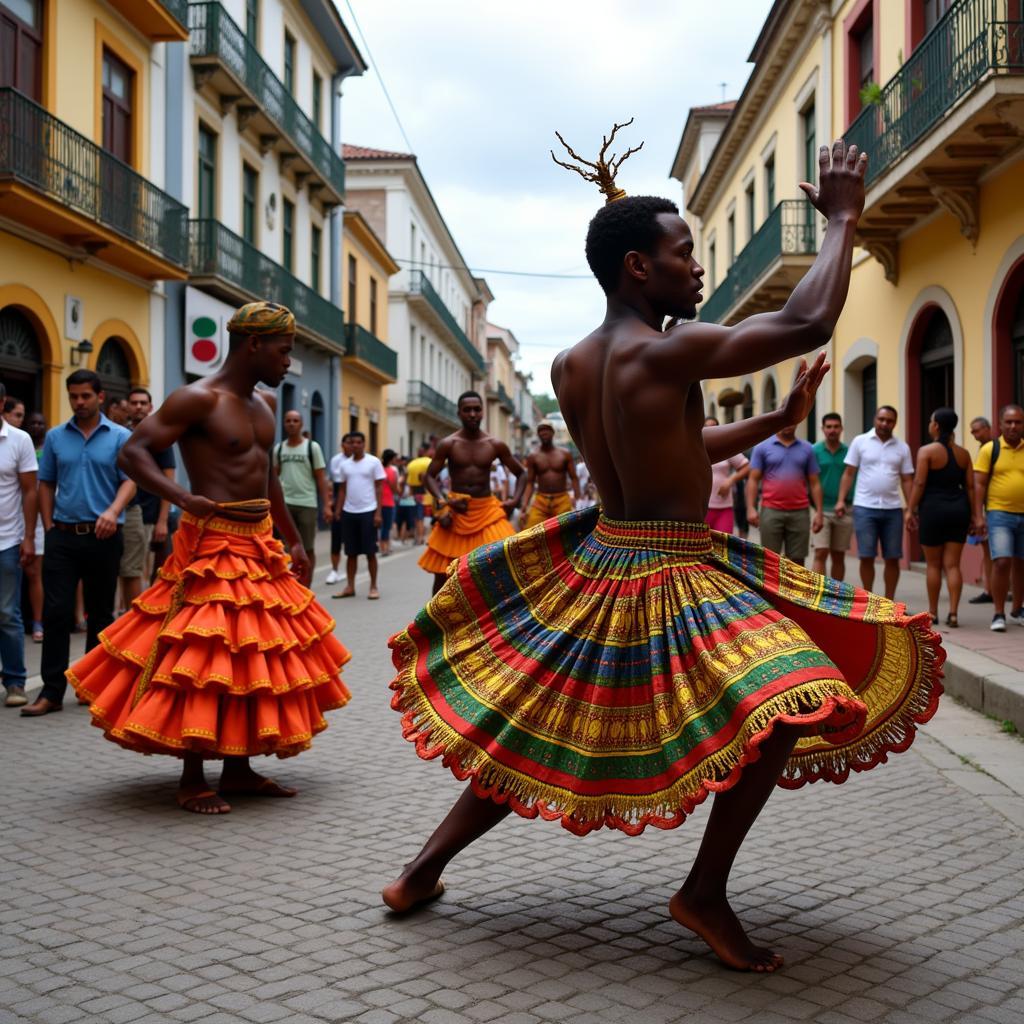African Immigration to Latin America: A Rich and Complex History
African Immigration To Latin America began centuries ago, intertwined with the transatlantic slave trade. However, the narrative extends far beyond this painful period, encompassing a rich tapestry of voluntary migrations, cultural exchanges, and the enduring legacy of African descendants in shaping Latin American societies. This article delves into the multifaceted aspects of African immigration to Latin America, exploring its historical roots, cultural impact, and contemporary dynamics.
The forced migration of Africans during the slave trade represents a dark chapter in human history. Millions of individuals were uprooted from their homelands and transported to Latin America, where they were subjected to brutal conditions and exploited for their labor. This period indelibly marked the demographics and cultural landscape of the region. However, the story of African influence doesn’t end there.
Beyond the Slave Trade: Voluntary African Migration
While the slave trade dominates the historical narrative, it’s crucial to acknowledge the waves of voluntary African migration that occurred both during and after this period. Merchants, sailors, and other individuals from various African regions chose to settle in Latin America, contributing their skills, traditions, and cultural practices to the melting pot of Latin American societies. This aspect of African immigration is often overlooked, and further research is needed to fully understand its scope and impact.
From Brazil to Colombia, and across the Caribbean islands, African traditions have profoundly influenced music, dance, cuisine, and religious practices. Rhythms, instruments, and musical styles originating in Africa have become integral parts of Latin American musical genres like samba, salsa, and cumbia. Similarly, African culinary traditions have enriched Latin American cuisine with dishes and ingredients that reflect the diverse heritage of the continent.
Cultural Impact: A Tapestry of African Influences
 African Diaspora's Cultural Impact on Latin America
African Diaspora's Cultural Impact on Latin America
The influence of African spiritual beliefs is also evident in various syncretic religions that blend African traditions with indigenous and European elements. These religions, such as Santería in Cuba and Candomblé in Brazil, serve as powerful reminders of the resilience and adaptability of African culture in the face of adversity.
Contemporary African Immigration to Latin America: New Chapters Unfolding
In recent decades, new waves of African immigrants have arrived in Latin America, seeking economic opportunities, fleeing conflict, or pursuing educational opportunities. These contemporary migrations add further complexity to the already rich tapestry of African influence in the region. These new arrivals bring with them diverse skills, perspectives, and cultural practices, contributing to the ongoing evolution of Latin American societies.
african americans and hispanic groups wars
Understanding these contemporary migration patterns is crucial for developing inclusive policies and fostering intercultural dialogue. This requires acknowledging the unique challenges and opportunities faced by African immigrants in Latin America.
What are the main reasons for contemporary African immigration to Latin America?
Contemporary African immigration to Latin America is driven by a combination of factors, including economic opportunities, political instability, and educational pursuits. Many African migrants seek better living conditions and employment prospects in Latin American countries.
How has African culture influenced Latin American music and dance?
African musical traditions, including rhythms, instruments, and vocal styles, have deeply influenced various Latin American music and dance genres like samba, salsa, and cumbia. These influences are a testament to the enduring legacy of African culture in Latin America.
Why is it important to study African immigration to Latin America?
Studying African immigration to Latin America is crucial for understanding the historical, cultural, and social dynamics of the region. It sheds light on the complex interplay of cultures and the contributions of African descendants to Latin American societies.
Conclusion: A Continuing Journey of Cultural Exchange
African immigration to Latin America is a multifaceted and ongoing process that has profoundly shaped the region’s identity. From the forced migrations of the slave trade to the voluntary movements of individuals seeking new opportunities, African immigration has enriched Latin America with a diverse tapestry of cultures, traditions, and perspectives. Understanding this rich and complex history is essential for building a more inclusive and equitable future for all. Further research and open dialogue are crucial for uncovering the full story of African immigration to Latin America and its enduring impact on the region.
FAQ
- What is the historical context of African immigration to Latin America?
- How has African cuisine influenced Latin American food?
- What are some examples of African-influenced religions in Latin America?
- What are the current trends in African immigration to Latin America?
- What are the challenges faced by African immigrants in Latin America?
- What are some resources for learning more about African immigration to Latin America?
- How can we promote greater understanding and inclusion of African immigrant communities in Latin America?
Common Scenarios:
- A student researching the historical impact of the transatlantic slave trade on Latin American societies.
- A traveler interested in exploring the African cultural influences in Latin American music and dance.
- A policymaker seeking to understand the challenges and opportunities related to contemporary African immigration to Latin America.
Further Exploration:
- Explore other articles on our website about the African diaspora and cultural exchange.
- Research the specific experiences of African immigrant communities in different Latin American countries.
Need support? Contact us 24/7:
Phone: +255768904061
Email: [email protected]
Address: Mbarali DC Mawindi, Kangaga, Tanzania.


